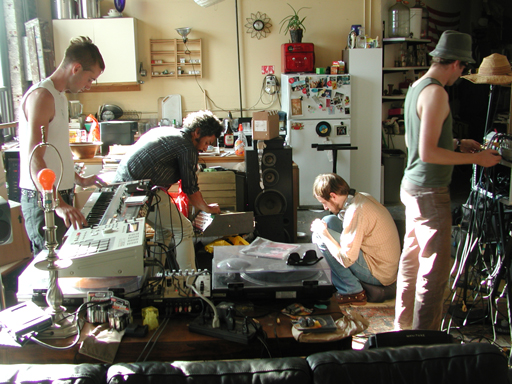
The Correspondences:
John Fell Ryan
In the early years of the Twenty-First Century, as attention fell upon various Brooklyn bands who circumscribed the borough's Indie rut with divers methods of effacing the divide between popular and experimental musics—namely, Black Dice, Animal Collective, Oneida, Gang Gang Dance, Sightings, Mouthus, Double Leopards—one group, Excepter, stood apart with their deeply-evocative, yet disarmingly-blunt, music and, in turn, the rigorous and meticulous presentation of said music. The band uses electronics and vocals, with on occasion other instruments, an approach that ostensibly would not distinguish the group. But beneath the surface, any other effort at analysis has proved to be hopelessly arcane. We could say Excepter is many things—"things" in this case being our proscribed music-cultural movements, aesthetic styles, and methods of instrumentation and composition—of which we would include: Improvised Electro-Acoustic, Noise, Industrial, Experimental Electronica, Dub, House, Electro, Techno. Any way, in contemporary music Excepter are simply incomparable. Though, one could hazard to explain the connections between Excepter and certain other collectively-improvising (and -branded) groups who in their genre-obvliousness easily eclipse the excessively-conservative, academic-minded experimental scenes of the 1990's, all the while avoiding the new century's vogue for Noise as music and "noise" as conceptual bugbear: for example, Supersilent, Polweschel, Thuja, Charalambides, Jackie-O Motherfucker, Pelt, the Vibacathedral Orchestra. Excepter also drew the inevitable attention that came from its leader, John Fell Ryan, once having been a member of the No-Neck Blues Band, an exemplary group who have bridged the gap between Rock and Improvised music better than any other, making such categorizing null and void (ideally, that is) and clearing the space in which these other similar groups could either make their mark, radically change their methods, or achieve a signifiance beyond the purview of even the artists themselves. Moreover, Excepter (as well as Animal Collective) engage with the human voice, and, thus, popular-music and other song-composing traditions, to a greater extent than the rest of these artists.
Ryan and Dan Hougland have been Excepter's two constant members; Macrae Semans was replaced early on by Nathan Corbin, while in the summer of 2005, Caitlin Cook (whose vocals were an obvious distinguishing trait) and Calder Martin left, with Jon Nicholson signing on. While the quintet version and smaller variants of it featured on Ka [2003], Obedience [2004], Throne [2005], and Self Destruction [2005], the quartet performed nearly all of Sunbomber [2006], Alternation [2006], and Tank Tapes [2007]. In 2007, both Lala Harrison and Clare Amory joined the ensemble, thus forming the group to be heard on Debt Dept. [2008]. Visit Excepter's official Web site to learn more about, and listen to, their records, including their archive of M. P.3's of live performances (the STREAMS series). The three exchanges of questions and comments with John Fell Ryan have largely transpired via electronic mail. The photographs by Jon Nicholson that grace Part 2 and Part 1 of the Correspondence were taken during the group's U. S. tour of May 2006.
--

Lala Ryan - Coney Island, 2007
J. Kaw
You have spoken of improvisation as a habit, a comfortable task for Excepter to take on when engaging in live performances and recording. Yet, as we have discussed in the previous correspondences, Excepter's records consist of what once were improvisations, extensively edited to the extent that most of the tracks, to the random listener, could seem to be the product of a single composer creating the various parts over time, instead of an ensemble at work in real time.
Excepter thus refrains from the commitment to improvisation seen in improvised music per se—Improvised music—which though not necessarily ideological, certainly reflects a perception on the part of the participants of themselves as, above all else, musicians who improvise. The consequences for these artists, socially and economically, is well known to those who have spent even a small time of amount attending their performances or trying to find copies of their records that long ago were put aside. I imagine many listeners with a popular-music background have found themselves wishing more Improvised music artists would conceive of albums as pieces of music with an internal logic all their own, instead of giving greater attention to pursuing a myriad of combinations of musicians. However different Excepter is from Improvised artists, a tendency toward improvisation and an appreciation of its results not only characterizes the band's work, but especially distinguishes Excepter from many of the artists it is frequently compared to.
The comments you've made suggest that improvisational methods continue on as a sort of legacy, perhaps once having an aura or value in and of itself they now lack. Beyond its practical import, do philosophical or ideological reasons for improvisation guide Excepter today? Did they in the past, at least for the individuals if not for the group-project as a whole?
John Fell Ryan
Excepter does not have a guiding philosophy, nor is there any concrete reason why we improvise. We don't talk much about the nature of our music. Don't get me wrong: as a lyricist, I have a concern for words, but as a musician, I also understand their limitations. I see concepts more as shapes, and music more as a physical alternate reality. Maybe improvisation is the wrong word, and not just for the negative social associations you mention above. Cultural forms based on freedom eventually become negative constructs engineered to keep supposed opposing forms out of the communal tapestry. So we avoid improvisation as a genre and social construct, even though we use the technique.
El dictionary says to improvise is "to compose and perform or deliver without previous preparation"—but what does it mean to continually improvise, year after year? Is not all previous improvisation or action preparation? So, improvisation does not exist beyond an illusory present. Is improvisation "working only with what is around?" What is not around? Therefore, non-improvised acts do not exist either. We can conclude that improvisation negates algebraic logic and opens some paradoxical operational reality. We are in the pornographic realm of what is not communicable in society, the proverbial "I know it when I see it" judgment call. It's all beside the point, for what Excepter does could never fully be improvisation; we bring too much equipment, spend too much time setting up, and use too many prepared sequences and programs.
"Intuition" is a better term. "Improvisation" is from the Latin for "unforeseen"—contrarily, much of what we do involves prophetical techniques. "Intuition" is a word that barely exists. The ad hoc verb-form "intuit" sounds terrible and no-one likes using the term. Intuition goes against the Puritan "show your work" ethic so ingrained by our school and culture systems. Mathematicians will often intuit theorems years before they can be proven logically. Intuitive acts are "ahead of their time" despite often being equated with superstition or confused with instinct. When Arthur Lee sings, "I believe in magic, because it is so quick," he's talking about intuition. Intuition's quickness is the key to the phrase, "crazy like a fox." Jung's championing of intuition is perhaps the real reason his work is not taught in "serious" schools, intuition rendering schooling unnecessary. Ironically, you hear more about intuition in business circles, perhaps because the field is more results-oriented (capital) than process-oriented (labor), perhaps explaining the general fear of intuition among the group of rockers who traditionally objectify the working class, and require artists to work with their hands and have their songs written down and reproducible. FACTORY types. Intuition can explain the seeming paradox of editing improvisation; things are done because they should be, because there is an idea that needs realization. If an intuitive form can survive the randomizing processes of mechanical misinterpretation and band reproduction, it's because that idea has resonance in reality as-it-is—or, for the lack of a better word, truth. This is why our music seems to foretell the future, and also why Ouija boards do not work when you're alone.


Frank Macias - Valparaiso, Indiana, 2007
J. Kaw
On this topic of improvisation, to get a better idea of how Excepter performances take shape, could you lay out what was done to the "original" version of "The Rock Stepper" to create the version we hear on STREAM 36?
Here, we are defining the original as being those elements of the track as it appears on Alternation that were available for use, which I would guess most of all are the base drum-beat and the repeating melodic line. With a track like "The Rock Stepper," despite the manipulations it goes through, does its position as, relatively, a pre-arranged completed composition in Excepter's oeuvre entail the band deciding beforehand the song would feature in that particular performance, or was its entrance into the performance an improvised act by one of the members?
If the latter, we arrive yet again at the breaking down of the divide between composition and improvisation, of records and performances, because the pieces that ostensibly have a definite form break into fragments to be used in new contexts.
And of course, "Knock Knock," which for the listener has even less of a certain presence, an unchanging core, than "The Rock Stepper," has fittingly been subject to reformulation, resulting in the recently-released version "KKKKK" on the split 12" with Panda Bear; an earlier version, "Knock Knock Knock," is included on Streams 01, which itself features "BB + B2," a variant of "BB + B" from Self Destruction, in which case the identity of the original appears even less definite than in the "Knock Knock" examples. Indeed, seemingly "BB + B" is closer to "Jrone" in that it's a fragment adaptable to more situations than a "song" like "The Rock Stepper."
John Fell Ryan
Both "Knock Knock" and "BB + B" are basically just drum-machine patterns; so, without pre-programmed melodies, they lend themselves to wider interpretation. The core composition of "The Rock Stepper" was created (and remains) on an Electrix Repeater four-track loop sampler; it consists of a sampled drum loop, a bass-line, and four-note synth part, all of which basically just repeat as I lay down the vocal and the band jives on top. [Psychic gear heads know we MIDI-synched the looper to a combination of analog sequencer-synthesizer combinations.] For STREAM 36, we wanted to present the song fairly close to the album version, as Alternation had just come out. I had the lyrics taped to the floor and after each verse I threw faders up and down and sent loops through MIDI-synched echoes while I memorized the next verse. Other times, like in STREAM 34, I tossed some "Rock Stepper" lyrics over a completely different track. On STREAM 39, "The Rock Stepper" shows up time-stretched down and with different lyrics. On STREAM 01, the Electrix Repeater is synched-up to the 808 so there's a 4/4 kick to the thing. I'd hadn't yet named the track or written the Alternation-version lyrics at that point.
For some shows, we plan ahead what "songs" we're going to do. We'll say, "OK, let's start with a drone piece from Jon, then I'll come in with some drum-box/sequencer jam, then we'll go into 'The Rock Stepper,' then Nathan you do something, then we'll go into 'Knock Knock,' and then Nathan again, then this track," etc. Sometimes we'll decide to take turns leading the rhythm tracks but leave the decision of which track to play up to the individual members. We don't tend to write out set lists, and once we get going our original plans often get thrown aside by the impromptu nature of our performances. Recently, with STREAMS 40 and 39, we've ditched much of the pre-programmed material and concentrated on building one continuous piece with much of our equipment MIDI-synched. STREAM 35 was also a stab at a long continuous piece. Excepter has melodies, lyrics, and rhythms we use over and over again, but imagine these are like playing cards and we lay them down in different hands. But often "games" fall away and we use these cards in magic tricks or plain old 52-pick-up gags.

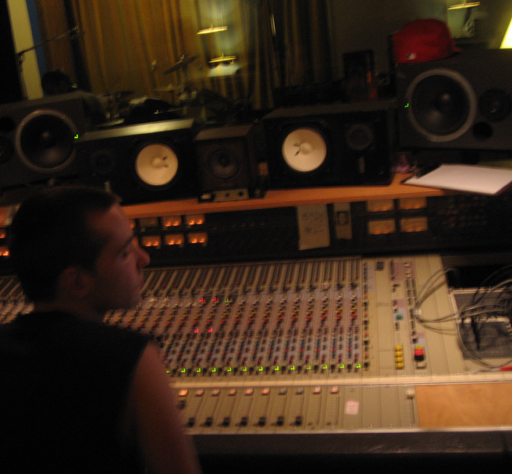
John Fell Ryan - Seaside Lounge, Nathan Corbin recording Debt Dept., 2007
J. Kaw
Let's turn to Dub music, which you have on several occasions noted as an interest and inspiration. Historically, Dub music occupies a place in popular music much like that of Blues music. Both serve as a mythical origin to what has come in their respective wakes: in the case of Blues, the tradition of the singer-songwriter with a guitar, liberated from the past, able to sing and play freely. This primary position of Blues remains even with "progressive" and radical variants of Rock. For the relatively dominant and freed-from-convention singers of the post-Punk milieu, as well as the "guitar god" who strives to be the main attraction, Blues offers lessons that must be heeded, even if only in an unacknowledged, indirect way. Dub music plays a similar role for recording artists, that is, for any artist who ultimately wants to make records the listener will listen to closely. Even with regard to music that came before Dub, insofar as the exploration of the possibilities opened up by new technology led artists beyond the simple notion of recording as a document, more accurate the better the equipment, of what took place in a live performance, they confirm the salience of what Dub artists would later do.
I'd posit that the simplest way to comprehend Dub's varied lessons is the space between the ears. Dub entails the heightening of one's awareness of the full spectrum of that space. The significance of bass tones in Dub of course derives from its development out of Reggae music; more important, it serves as an aesthetic link to the nearly contemporaneous development of Rap/Hip Hop and allowed Dub to be extensively influential on the course of electronic dance music. More important still, an appreciation of music grounded in deep bass tones, mirroring the understanding of music available from the vantage point of popular music, with its different traditions defined by their set rhythms, theoretically leads one to an appreciation of the progression upward into higher frequencies, of the interaction of sounds within that progression through aural space, as well as the movement and layering of sounds temporally and in physical space from left to right across the listener's range of hearing. Dub embodies an imaginary primary form of music created by the individual artist alone in the studio, of electro-acoustic manipulation of extant forms and electronic creation of new forms. Reggae tracks are recontextualized, and the results of the process feed-back into Reggae, and yet also encourage the Dub artist to go forth onto different, independent courses. In turn comes the understanding that even the original Reggae track was a dub, if one wants to think of it that way. Contrast this framework with the place of the "remix": its limited goal of making the track to be remixed more danceable. Appropriately then, Dub's influence on other musics serves as a sign of which artists took the plunge into the vastness of what's possible with recording (or remixing) and came out with a final product that successfully takes the listener into its own aural space. Whether it be communities like the Post-Punk of The Slits, The Pop Group, and the numerous Adrian Sherwood projects or the current Dubstep scene, or disparate artists, of which Arthur Russell, Bill Laswell, Underworld, Basic Channel, Vladislav Delay, and Pole come to mind, Dub remains a core inspiration, a focal point to return to.
Excepter may be considered one of these artists, though not one that regularly uses the commonly-recognized sonic traits of Dub. Indeed, I'd say that Dub's influence is greater when the artists it has inspired don't see it is a genre to join, or a trademark array of effects to imitate. Could you, in addition to any critiques you might have of my own take on Dub, describe its influence on your approach to creating records? In your 2007 interview with Hair Entertainment, you mention an early group of yours, The Black Lotus; from the description there, and knowing the music of The No-Neck Blues Band, Excepter represented a major shift in your work, toward the meticulous editing, and to an extent composing, of recordings, and the melding of those recordings into records, by yourself. In this sense, and in the way discussed in the first correspondence, Excepter is "anti-social." To what extent does Dub or any other artist or group of artists explain Excepter's origin?
John Fell Ryan
Before we get into Dub, maybe I better clear up a few things about my history. The Black Lotus (at least for the first performance) was not free-form, but a structured improvisation. The format involved maybe seven players with guitars and amps facing inward in a circle, instructed to let the guitars feedback atop their amps, but to avoid any high-end feedback. After an hour or so of seven guitars feeding back, I initiated that rhythms were to be slowly introduced. We had a few drum kit parts, pieces of metal, and a length of chain. From then on, extra players (23 total?) came and went with various instruments and approaches, but the core seven remained focused on maintaining the drone for the duration of the seven hours.
I wouldn't say my musical career has been following a trajectory away from live group improvisation and toward solo, controlled studio work. Excepter may have marked a break from the past and introduced my interest in editing and studio electronics; but these were things I've always wanted to do, but never had the chance to in No-Neck (Black Lotus was an un-recordable experience).
I wouldn't say Excepter is anti-social with respect to itself. We're all pals in real life. I would say there is something(s) about Excepter that stand us against society-at-large, the music industry, other bands, in the same way comedians and graffiti artists are "anti-social." We're polite about it, but we still end up hurting feelings. The sexy fashion/Rock scene does not come see our shows.
But on to Dub: yes, it's a big influence, mostly in that it's the majority of my daily listening, mostly Lee "Scratch" Perry productions. I usually call it Reggae instead of Dub, because I'm leery of that section of the populace that likes Dub because it doesn't have too many vocals. The lyrical content of Reggae—the Rastafarian angle, the political angle, the mystical angle, the folk-hero angle, the word-play, the humor—that's what's in it for me. Reggae itself is a misinterpretation of American Soul music; maybe I wanted to do that in turn: misinterpret a misinterpretation. I'm into the "doubling" side of dub, and that goes beyond music. I'm into mirrors, palindromes, symmetry, opposites, conflicts, reversals, marriages, paradoxes. I'm into the Rastafarian model of the world as living metaphor between hard reality and the "Land of The Bible," seeing history in the present and vice versa. Philip K Dick had a similar vision with his "empire never ended" concept—his Babylon.
Maybe about ten years ago, I saw a raw-footage videotape of an interview with Lee "Scratch" Perry in his Switzerland home. On the Internet you can find "versions" of this studio tour he likes to give strangers with cameras. Seeing this realized my concept of the producer as artist, and the artist as "Gentleman of the Universe." I came up through film, and understood the director as author of his world of little choices with big effects. That "Little World" is real and its effects are real. Art is a battleground. Why else would we destroy money and value so fervently, if not for war? In this regard, the producer becomes a bureaucrat, filing information away in such a way as to slow death's approach. Printing your own money, etc. Tank Bank, Inc.
But back to Dub, once again, once more, through a time-warp. To Dub:
Dub is the process of modernization in music: to expose and explore multiple viewpoints, to find "righteousness" in the void, to fight "holy wars" in shifting rhythms. Madness as a chessboard. Reduce the elements, repeat and multiply. Time-stretching—Teleportation. Reusing old recordings. (ECHOO7) re-Ordering. Street level reality, that's the entrance to the music world. You need to check in with the door, after that. You're on your own.

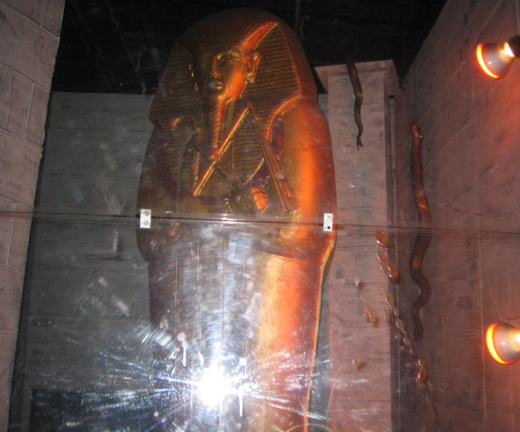
Lala Ryan - Coney Island, 2007
J. Kaw
Apropos this discussion of Dub and the idea of enhanced awareness of aural space, wherein the music envelops the listener, blocking out the world and taking him "elsewhere," I want to point to two outside sources for a moment. In the aforementioned interview with Hair Entertainment, you discuss the immersion of the sentient individual in sound, the sub-conscious rising to the fore during the act of making music, especially with regard to your vocals, and sound having a direct effect on the brain. Now, turning to a passage from Robert Anton Wilson's Prometheus Rising, Chapter Two...
"The brain appears to be made up of matter in electro-colloidal suspension (protoplasm). Colloids are pulled together, toward a condition of gel, by their surface tensions. This is because surface tensions pull all glue-like substances together. Colloids are also, conversely, pushed apart, toward a condition of sol, by their electrical charges. This is because their electrical charges are similar, and similar electrical charges always repel each other. In the equilibrium between gel and sol, the colloidal suspension maintains its continuity and life continues. Move the condition too far towards gel, or too far towards sol, and life ends."
Any chemical that gets into the brain changes the gel-sol balance, and 'consciousness' is accordingly influenced. Thus, potatoes are, like L. S. D., 'psychedelic'—in a milder way. [...] Since "what the thinker thinks, the prover proves," all of our ideas are psychedelic. Even without experimenting with diet or drugs, whatever you think you should see, you will see."
Following this line of thought, which only states what most already know in practice—that the line between a drug and a non-drug is blurry—we must also say that the line between music that's psychedelic and music that's not is similarly difficult to draw. If I say that Excepter's Throne is psychedelic, as I have, then according to common definitions of the word, I am saying that the music liberates the mind in some way, or perhaps merely evokes the effect of drugs on the mind; the nature of said liberation could be a heightened concentration, an expansion into new conceptualizations, and a relaxation of negative or otherwise overwhelming thoughts. Per the Wilson passage above, the music's sound waves literally shift the gel-sol balance of the listener's brain. Yet, in spite of Wilson's contention, in common parlance if something consumed by humans is to be considered psychedelic, it must offer mind-altering substances in concentrated/purified form. In music, we could use this framework and suggest that music which offers a captivating or stunning "dose" of sound waves is psychedelic, especially for novice listeners. But now, we're back at Wilson's open-ended, amorphous point of view on the subject. As noted above, music can merely evoke, perhaps imitate/recreate, the experience of the mind under a drug's sway; indeed, one would think that music cannot physically have the same kind of influence. Then again, as you speculate in the Hair Entertainment interview, there could be scientific research into the question of the influence of sound waves on the brain which disputes such an assertion.
Either way, if in the 1960's, new electro-acoustic effects and their simple, yet dramatic, use gave listeners who were accustomed to music as something which took place in real time experiences akin to those of certain drugs, then what present-day music could conceivably have such an effect? The stock answer in this young century seems to be Noise music: if the extremes of musical dissonance have already been explored, then what's left is reveling in these extremes, whether it be the heavy bands of wide range of frequencies of Noise music, or the use of Noise music's methods in Rock, to create a persistently-deconstructing version of Rock that could out-do Punk's similar tactic. I prefer to emphasize music's limitations in this regard, to avoid a particular genre (Psychedelia, Noise) being lionized as a tangible or palpable experience for the listener. If the listener only becomes aware of music's potential when confronted with music that is especially loud or dense, he only shows he's not much of a listener. While Excepter's music, including the second track of Throne—the bulk of the record—as well as that of Animal Collective and Double Leopards, just to point to two artists Excepter tends to get grouped in with, at times have a sound akin to Noise music, in general the works possess more of a symbiotic, interdependent relationship with their aural environment, including the listener. To the extent to which the music becomes a world in and of itself, the listener creates that world. Ideally, the music-artist understands that he does not decide if his music envelopes the listener; it is the listener's choice. A massive, rising swell of sound that diminishes the world beyond it does not exist on its own, but as part of a listener's subjective experience.
The point here is not to work out a definition of Psychedelia, or even to criticize Noise music, but to begin to ask how music effects us, changes our mind. Neuroscientists will develop their particular approach toward the object, and bio-technology may eventually offer ways to control sound's relationship with our bodies. Nonetheless, perhaps the old humanist valorization of creativity, of adding to the world instead of destruction, is useful as a starting point—certainly, for some, a vapid suggestion, but in response I could point to the vast number of individuals involved in the music "industry" who do not make music themselves. Add to this perspective John Cage's classic notion of listening to the sounds already present, that a Noise music composition already exists around you at any given moment of your life, and we then have a counterweight, a suggestion not to create, instead take stock in what's been created, by you or anyone else.
Thus, learn which aspects of your environment and daily life are already "psychedelic" in its effect on your person; see if their influence actually does tend toward the freeing of your mind, or to its restriction to known, routine paths. Funny, then, that Wilson mentioned potatoes, as Americans eat a lot of them. If they smoked more pot, they wouldn't eat so many potatoes. Seriously now... then you re-build up from there, perhaps along Timothy Leary's eight circuits of the brain's "hardware" that Wilson analyzes in the aforementioned book; or develop a framework with which to understand music and art, as I have with my Sweet Pea writings, with their vocal-centric philosophy. But of course, the illusion of control drives individuals too far in particular directions, losing track of their bodies by wandering far into their minds. The circle starts over again: there's always the comedown from psychedelic highs.
John Fell Ryan
Well, you must eat, shit, talk, and fuck to participate in "reality," but you don't have to. I noticed that around show time my hunger and digestion go right out the window. I start squabbling, get petty and business-like. Then comes the pacing and programming. Waiting, drinking, smoking, etc. Suddenly, a switch is thrown and the show is on.
Things happen and sometime later another switch is thrown and the show is over. We go back to squabbling and being business-like, super-thirsty, tired. It's not until I go back over the recording, maybe days later, that I get a sense of what "happened" at the show. You become the details in the act of performing. There's no way of memorizing what happened without a mental score. You learn not to count on your emotional read of any performance. After a while, the repeated disparity between audience and personal perception of a show trains you to look back with a multiplied viewpoint. Emotion is one of the things that gets blown out in our shows, but it's important to go beyond simple catharsis. That's one of the reasons we've been tending to play longer and longer sets, to get beyond the shock and go further. In the Leary model, we jam the first four circuits not just for the "high" of five but also to wreak havoc with the upper-eight, programming levels. Memory blows out, too. Identity. Our machines are in sympathy with this: half our equipment operates with faulty computer memory. Only living circuits left. I've see dead machines work again through sound. People get ideas.
It's a strange thing with language: I'll go back to a recording I thought was gibberish and hear clear words, but go back to a recording based on written words and be surprised by its incoherence. This is when you start to make friends with the Modernists. I used to think that name was inaccurate, doomed to date itself, but now I understand the future is always two, three steps beyond the current time. The world Joyce, Pound, et al., describe still exists, in viewpoint(s).
But what isn't observable to our "First Four" friends, is that the future is just as, if not more complicated than, cul-de-sac reality. There are three other realities beyond Five, oh yeah, and it kills you. Believe me, we in Excepter spend much of our time getting our ass kicked by science. When you are reading constantly at the limit of comprehension, you notice it begins to effect the world around you, you notice yourself noticing the ripples in sympathy with other visions articulated in art-form, whether words or shapes. That is music.
Then the lights come on.
The problem with space travel: all the people left behind get only the exhaust. This is not the Sports-Utility divide they drive. With imagination doing all the work anyway, why bother with the machine of showbiz? We keep the props around, just in case someone's memory snaps and we become, for an instant, "art." We don't joke about writing songs about the weather. Someone's grandchildren will thank us for immortalizing a time before permanent rainfall. The STREAM we predict.
Any experienced musician will tell you this has zero to do with drugs and much more to do with a complex formula of simple stresses.

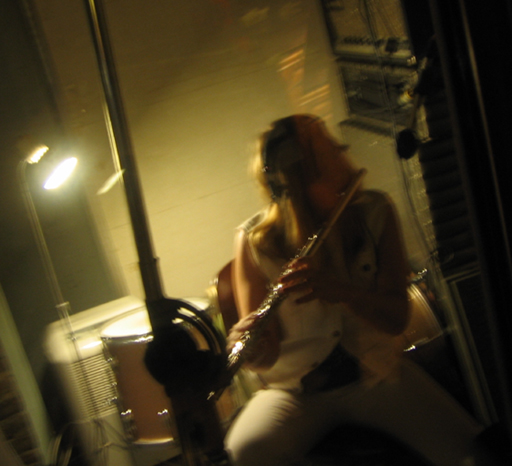
John Fell Ryan - Seaside Lounge, Lala Harrison recording Presidence, 2007
J. Kaw
Excepter recently far surpassed the goal of an 80-minute M. P.3 you stated in the first correspondence with its 5-hour document, STREAM 40, of your performance, 40,000 Leagues Under the Sea, February 24th, 2007. For those who were not present, could you describe the setting, or any noteworthy aspects of what you called the "extreme camp of performing dinner theatre"? What was different, if anything, about the group's preparation for such a long performance? Was more editing (or adding of new elements?) involved with this M. P.3?
Excepter's music and approach to live performances seems conducive to further explorations of long performances, or rather of the blurring of the line between a gig at a nightclub and, say, an installation at an art gallery. Has Excepter given thought to the idea of extensive, perhaps inter-media, events that would exist less as a singular work, with a set beginning and end, and more as an environment that, if not for the artists, at least for the listener would have an existence beyond his willingness or capacity to know it? Granted, of course, that for anyone who arrives at a gig after the performance has started or leaves before it ends, the performance already takes such a form.
John Fell Ryan
STREAM 40 was recorded at the Williamsburg restaurant Monkey Town in its back screening room. The room is roughly cube-shaped, with projection screens on each of the walls. Against the walls are futon recliners with short, long tables for the audience. We set up our equipment in the middle in a square and performed around it. It was dinner theatre in that the audience was served dinner and drinks while we played. Our A. V. man Frank Macias filled the four-screens with a live video mix of the Disney D. V. D., 20,000 Leagues Under The Sea, slowing it down to half-speed and using a room camera to perform superimposition and feedback effects. There was only room for about 40 people, so there were two "seatings" that night. We started playing before the first audience was let in. After two hours, they were ushered out; our machines continued to play themselves while we took a half-hour break before the next audience was let in. The response was so positive and we were so spaced that after our second two-hour set we did a two-hour encore. I would say no one, including myself, witnessed the entire performance from beginning to end, so your idea above about performance-as-environment was certainly realized.
The M. P.3 is edited together from two 150-mintue minidisc board recordings and various videocassette recordings Frank made. My minidiscs ran out and missed much of the encore and Frank's camera missed part of that as well, so there's an hour or two of the night missing from the ultimate M. P.3. If you listen carefully you'll hear a bit of the sound-check, the slow build of the first two-hour set, the drone during the break, and then elements from the first set in the second set. The whole experience was an experiment in doubling. In editing, my inexact attempts to synch the two different recording sources would result in an additional layer of echo, as the two layers of recording were mixed in and out of synch. We've used this style of editing before, as early as STREAM 04, mostly to preserve percussive elements or crowd noise not captured through the board; but since I've bought a tape recorder with adjustable speeds, time-manipulation and doubling effects are coming to the fore, starting with STREAM 39. (STREAM 40 and 39 are out-of-order chronologically for obvious allusive reasons.)
Constructing the five hour M. P.3 was a tricky task. I discovered I couldn't bounce my 24-bit ProTools session into a 5-hour .wav file for conversion to M. P.3 due to processing limitations. I was able to bounce it down in hour chunks and then stitch it back together in a program called Audacity. The conversion to M. P.3 and the uploading of the file to the web really put a strain on my computer. I resorted to putting the hard-drive in the freezer to cool it down, wrapping it in cold-packs for the long, hot job. I felt a bit like Chuck Yeager getting that thing to work and now it's the longest single M. P.3 in history! (At least for now.)
As for gallery installation-type long-form performances, Jon Nicholson of Excepter attempted just that in his 72-hour performance at the Grace Space gallery in Brooklyn. I only caught like eight hours of it on different days, but I think it's safe to say for the majority of the performance the audience was zero. We'll see if Excepter gets any offers from the art world to do an installation-type show, but in the meantime we've done another marathon-performance at Monkey Town, but this time with the theme of "space" instead of "sea." I didn't make a STREAM of that performance, because a second multi-hour M. P.3 would reduce the impact of the first. We'll see what happens with the recordings though. From what I've heard, there's some drone stuff that might make up part of our next project, Presidence: a return to the Throne style of zone music. [Ed. note: SINCE the time of behind-writing, the band have opted for "science" theme to be #3.]


John Fell Ryan - Washington/ District of Columbia, 2006
J. Kaw
Finally, earlier in 2007, Excepter let slip a new album, Tank Tapes, albeit in cassette form, without much attention. The band's also working on an album where apparently you will confine yourself to vocal duties, letting the other three members handle the electronics and other instruments. Given that each Excepter album has been a specific project, their progress often overlapping with each other, could you describe how these albums fit in with the rest of the band's work, both in their methods of production and their themes and general mood?
John Fell Ryan
Tank Tapes was recorded in one hour, direct-to-stereo, at my loft one afternoon in the Fall of 2005. I only cut out a few minutes to smooth-out one rough transition, and to form the two sides of the tape. There was no overdubbing. The music is basically one third co-programming of my analog set-up by Jon and myself, one-third Nathan's more militaristic M. P. C. programming, and one-third free synth jamming by the band. We had been getting asked to do cassettes left and right and went with Fuck It Tapes, mainly because of the name. It was supposed to be a tour item for our U. S. jaunt of May 2006, but I couldn't execute the cover art in time. I wanted it to be the male response to the exposed vaginas of the Obedience cassette, but I was having a hard time getting over having to draw penises and synthesizing the war theme of the tape. Eventually I gave our cover star two cocks to make up for the lost time!
Right now, I'm mixing/ editing our next L. P., Debt Dept. The original concept was that is was going to be a "dark Techno" record and that Nathan Corbin would come up with the music and I would only do vocals. Of course, the record was conceived years ago and was originally slated to be the fourth Excepter record. The cover art was completed before work on Alternation even started. Nathan has been using these M. P. C. programs live for years, so obsessive STREAMS fans will recognize all the backing tracks. To start the record off, Nathan made an instrumental demo C. D. with 16 tracks which was distributed to the rest of the band months before we headed into the studio so we could work on our contributions to the set. We recorded with Mitch Rackin again, at his new digs at Seaside Lounge in Brooklyn. Nathan laid down his tracks alone and the band added its performances later, with me locked in the vocal booth with my lyrics sheets and a bottle of Polish brandy. Even though I had written lyrics, they weren't necessarily written with specific tracks in mind, so the vocals were semi-improvised. As overdubs piled up, the album began to take shape. Tracks were selected for the album and additional production. After about a month or so of additional writing and deciding, we went back into the studio for a day to lay down more written lyrics and process the vocals.
As far as "themes and mood" go, we actually had a concept going in: MONEY IS ALIVE AND AFTER YOU. I had this idea of money being an independent viral life-form born out of the collective human psyche, but ultimately created to exist without it and against it. I think about how money lives on after you die. Vampire green cover, mirror zebras on the back. For Debt Dept., as noted above I planned on solely focusing on words and vocals: I do not play any instruments on the record (barring one brief synth rumble and maybe two shakes on a rattle). During all stages of production, I surrounded myself with words. Reading six books at once, writing palindromes, generating bureaucracy, centering on the words-on-words worlds of the Modernists: taking Finnegans Wake books on tape to the beach, reading The Book of Lies on the crapper... that kind of thing. Losing at Scrabble. Writing code. Low-level op stuff. Listening to radio, what people say, paying attention to the weather. Opening yourself up. Recording all of these processes of engaging became the narrative of the record: taking it back to band, using the Internet to pass draft mixes around. Communication became a big theme of record on an inter-personal level. The band coming together to make the record became a superhero team out to conquer this stock vllian. A struggle between contrasts. There are a number of former film students in the band and Eisenstein runs in the blood.
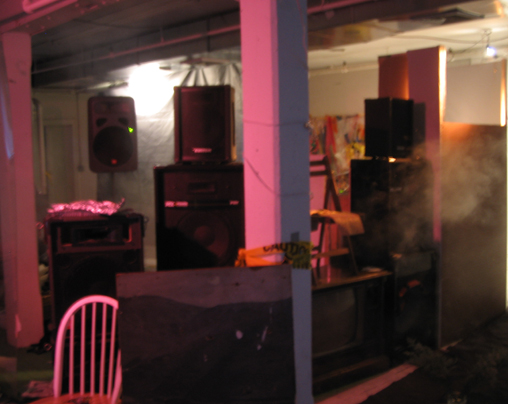
John Fell Ryan - Grace Space, Jon Nicolson, The Life and Times of Fritztabulous Von Super Bonn, 2007
